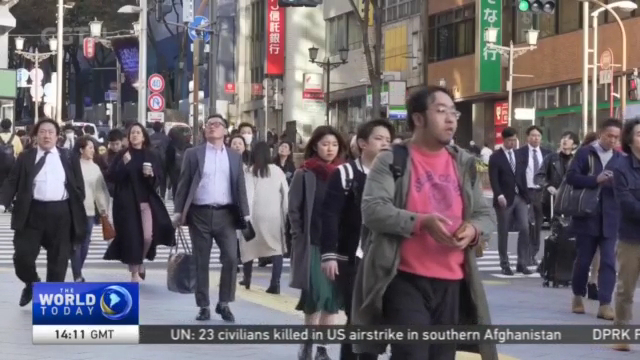
22:37, 30-Nov-2018
Japan Labor Immigration: More foreign workers could be granted legal stay
Updated
22:35, 03-Dec-2018
02:38

Japan has introduced an amendment to its immigration laws, that could further open up the country's labor market to foreign workers. Concerns already have been raised about working conditions for these workers. So, the big question now is about how to balance a labor shortage with worker protections. Terrence Terashima has more.
In a major shift in Japan's immigration control laws, parliament has passed legislation that could potentially open the country's doors to more foreign workers. The amendment will essentially create two new categories. A five-year visa, which is granted to foreign workers who have a certain level of Japanese in 14 undermanned sectors, the other is a renewable visa for more skilled workers, who are also allowed to bring their families. The government estimates it needs more than 340,000 workers in the blue-collar category for the five years starting April 2019.
TERRENCE TERASHIMA TOKYO "A shift in the immigration policy is an attempt to address serious labor shortages caused by an aging population and falling birthrate. But the public are cautious about implementing the legislation too soon."
In recent public polls, a majority of people say they want to hear much more debate on the matter.
"Currently, legal matters have not been cleared. It is better to start the new system after the rules have been made, and legal matters and other necessary laws have been set, instead of reacting to problems in the future."
But others believe an immediate solution is needed to address the severe labor shortage.
"We are all feeling the labor shortage. I know it is best to have a perfect environment, but we can always think of the legal aspects as it goes along."
There are a number of concerns with this policy, on all sides, with many believing the country has to learn from past mistakes. Japan has been allowing short-term visas for blue-collar workers on technical internships, however, they are often forced to work long hours, and this was criticized as a way to bring in cheap labor.
A comprehensive legal system is also needed to ensure appropriate working conditions. Another is a lack of social infrastructure. There have been cases in the past when rushed immigration policies placed a heavy burden on local communities and foreigners alike. While many municipal governments have said workers will concentrate in major cities, where the wages are higher, it's the suburban cities which are feeling the labor-shortage the most. Terrence Terashima, CGTN, Tokyo.

SITEMAP
Copyright © 2018 CGTN. Beijing ICP prepared NO.16065310-3
Copyright © 2018 CGTN. Beijing ICP prepared NO.16065310-3